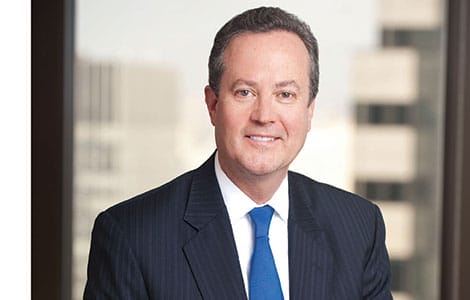At a certain point in his career, when Douglas Peterson, WG’85, was offered a job, he would think, “There must be something wrong there.”
But the president and CEO of McGraw Hill Financial was only kidding when he told that to the audience at his Michael L. Tarnopol Dean’s Lecture Series talk on April 2.
Yet again, when he was brought in as president of McGraw Hill subsidiary Standard & Poor’s in September 2011, it was in the midst of two major messes. S&P had only the month before downgraded the credit rating for the United States. Yes, those United States. And at the same time, the credit rating agency was still taking flak from the financial crisis, the implication being that either credit agencies were too inept to properly rate the financial instruments that nearly blew up the world, or were too conflicted to do their jobs.
How did Peterson feel being brought into that tumult?
“That is why they hired me,” he said, with the self-assuredness of Winston Wolfe, Harvey Keitel’s “cleaner” character in the 1994 movie Pulp Fiction.
Peterson helped S&P weather those storms (a federal lawsuit is still in process), just as he managed a turnaround job with Citigroup Japan in 2004 (one of several jobs he had at Citi during a 26-year career there). Then, Japanese regulators were up in arms because the banking giant’s private banking subsidiary was caught red-handed with illegal profits. Peterson’s job was to come in, clean up and make peace and rebuild trust.
Editor’s note: Find out more about his background and experiences at S&P in our 2012 Wharton Magazine interview with Peterson.
But the point is not to say that Peterson stepped into his current role solely to clean up a mess. Instead, he brings a global focus and clear strategic vision to an international company that’s been on a repositioning trend. The company is focused on providing data, analytics and benchmarks for the global capital and commodity markets; cutting costs; and selling weaker subsidiaries—such as its TV station group in 2011 and its education group in 2012. The moves appear to be paying off; the company has experienced an 11 percent annual compounded growth over the last three years.
The key to this success is strategic vision, which in Peterson’s case is a four-part framework, which he elucidated for his Wharton audience as:
1. Get clients to buy more of your existing products.
2. Get your existing clients to buy new products from you.
3. Expand internationally. McGraw Hill relies on a five-point rating for international financial markets, to know when to get into a country on the ground floor. “If you expand in the wrong way or too early,” Peterson explained, “you won’t make money.”
4. Disrupt innovation. “We want to disrupt ourselves,” he said, by reaping the results of research and development investment—before someone else’s innovation does it.
Although the game plan is to apply all four facets of the strategy at the same time, in all units, it sounded as if international expansion was the No. 1 priority.
Over the next five years, he said, the New York-headquartered company aims to grow its international business faster than its domestic. And if McGraw Hill Financial were to run into rough seas abroad, its employees, managers and investors can rest assured that they already have Peterson aboard, with his background in handling things when they go wrong.


























